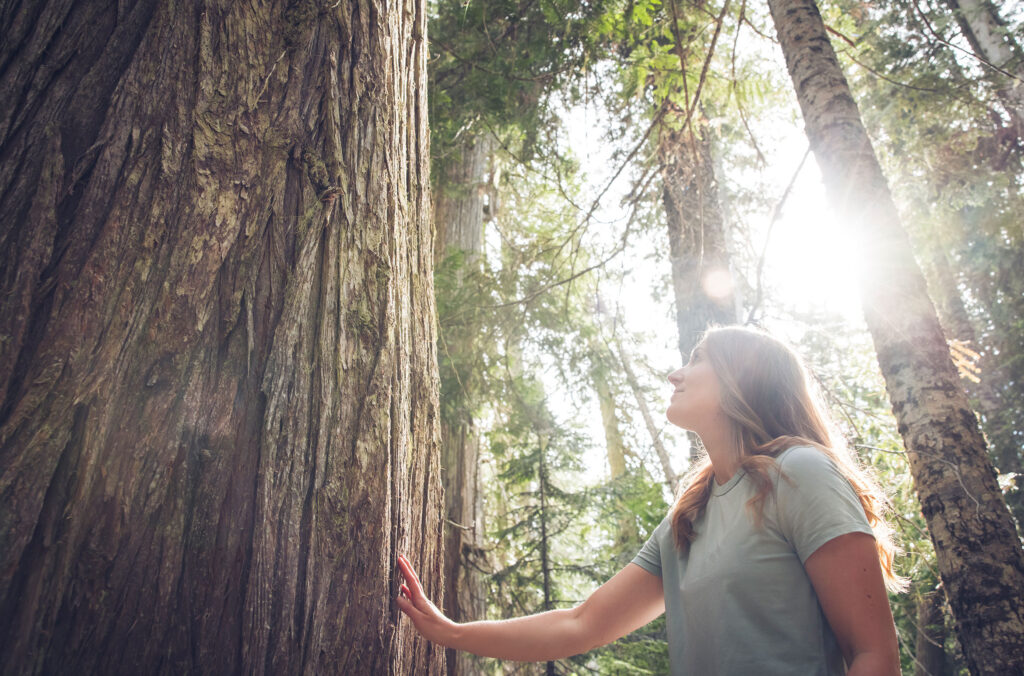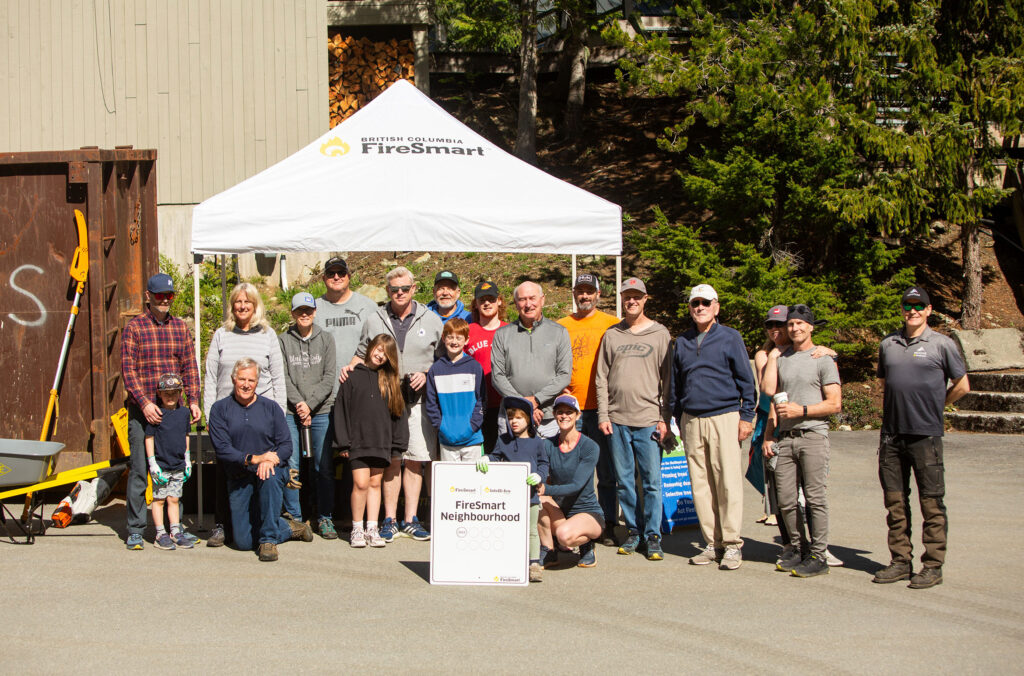Life in Whistler – for guests and locals alike – is heavily bound to the weather. Pow days and bluebird skies, beach sessions or hero dirt, whitewater surges, fast greens, patio sessions and more…what happens with the weather, happens to us.
And that weather is changing – bigger storms, longer dry spells and warmer and warmer summers, but we aren’t the only ones affected. Global warming and increased average temperatures, especially in forest-heavy areas like Canada, are changing the way forest fires act. Wildfires are burning hotter, longer, earlier and later in the season, and even affecting the weather around them in ways we have never seen.

According to many top scientists and recounted to Whistler locals by Fire Weather author John Vaillant at the 2023 Whistler Writer’s Festival, “Earth is entering into a Pyrocene era.” And how we deal with wildfires will be one of the most important facets of our future.
And the future is now. In 2023, British Columbia saw 2,293 wildfires occur, burning over 2.8 million hectares and incurring over a billion dollars in costs. Although that fire season saw an above-average number of lightning strikes, one important thing to know about wildfires in BC is that, on average, 42% of them are human-caused. Which means they are preventable.
What is Whistler Doing to Mitigate Wildfire Risk? What Can You Do?
For anyone visiting Whistler, it’s extremely important to know what the Fire Danger Rating is and act accordingly. This rating, updated daily, will dictate whether campfires, residential fires, and even gas-powered recreational vehicles are permitted within the Whistler town limits and adjacent wilderness. There are signs posted along the highway displaying the Fire Danger Rating, and hotel concierges and the Whistler Visitor Centre will certainly know what it is as well. For guests staying in the village who may not see the Fire Rating signs on the highway, it’s best to double-check if there is a campfire ban in place as those bans can be implemented at any time, even if the general danger rating has not changed.
Common sense is another huge ally in preventing wildfires. Never throw a cigarette (lit or otherwise) on the ground or out the window of a vehicle. As well, note that fireworks are only permitted within Whistler boundaries on Halloween (Oct 31 / Nov 1) and New Year’s Eve (Dec 31 / Jan 1). Even outside of municipal limits, fireworks during wildfire season is a terrible idea.
For Whistler, a community surrounded by forest, wildfire mitigation has never been more important.
“Whistler is what we consider ‘intermixed,” explains Fire Chief Thomas Doherty in a May 2024 podcast with Mayor Jack Crompton. “An ‘interface’ is when you have a neighbourhood that borders a forest belt, and we have a number of those. But intermixed means we have homes built right in the forest, and Whistler has a high percentage of intermixed. That heightens the risk for Whistler.”
Thankfully, a plan is in place. The Resort Municipality of Whistler (RMOW) developed a Community Wildfire Protection Plan in 2011 and, after much more input from experts, and ongoing efforts to reduce the risk of wildfire in the valley, Whistler Council adopted an updated Community Wildfire Resiliency Plan in the spring of 2022.
That document is 138 pages long but, in a nutshell, Whistler’s Wildfire Program is built on three main pillars.
“Whistler is leading the way when it comes to the Firesmart Program and vegetation and fuel mitigation,” Chief Doherty says, “but there is lots of work to be done. The community needs to be a part of this. As do all levels of government. This is all hands on deck.”
Wildfire fuel reduction is one area where great work has already been done. Since 2004, the RMOW has removed highly combustible organic matter such as dead wood, debris and small trees from 120 acres of land surrounding Whistler to help reduce the risk of fire spreading from the wilderness into the urban regions, or vice versa. In the spring of 2022, teams from the Province’s Mountain Resort Branch also performed fuel reduction work on approximately 74 acres of Whistler Blackcomb terrain.
The FireSmart Program
Aimed at Whistler residents and homeowners, the FireSmart Program helps homeowners understand wildfire risks unique to their property and learn what mitigation strategies can make a difference. These efforts can include raking up dry vegetation, coniferous needles, twigs, and any other dry organic material (aka: duff) from local properties. Also, cutting tree limbs to prevent ground fires from accessing the forest canopy or creating a 1.5-metre buffer of non-flammable material, such as gravel, around the perimeter of a home.
The other important aspect of Whistler’s wildfire program is about being prepared and ensuring everyone is aware of what to do in the event of a wildfire incident.
“Whistler has about 15,000 residents,” Doherty explains, “but we can have an average of 42,000 people in town on any given weekend, on a busy weekend it can be as many as 70,000. And a lot of those people who come here or even live here don’t have a vehicle.”
In 2019, Squamish and Whistler joined forces and finalized a Sea to Sky Multimodal Evacuation Plan, a 118-page document that includes model scenarios for any number of emergency evacuation reasons, including wildfires.
“We work with the Hotels Association to assist them in planning for evacuations and educating visitors,” says RMOW Emergency Program Coordinator Bob Manson, who adds that the best thing for anyone coming to Whistler to do is sign up for Whistler Alert, an emergency notification system to communicate with both residents and visitors during emergencies. With everyone working from the same information, and on the same plans, things go much smoother when they need to.
Another part of the plan includes “Muster Areas,” designated pick-up points where people without access to personal vehicles can go to be loaded onto busses, shuttles and even into vehicles with empty seats if there isn’t time to bring up more transportation options from Squamish or Vancouver. (Whistler also has a huge bike rental fleet that could potentially be mobilized and used for evacuation – it’s mostly all downhill to Squamish or Pemberton.)
Whistler Alert
“Even when a fire is small or far away, its smoke can be a significant health hazard,” Manson says. “Guests will be provided with information from public health officials that include warnings and recommendations. If the smoke conditions are severe enough to necessitate an evacuation, everyone will be informed through Whistler Alert and any other means possible.”
One natural benefit is that Whistler is set in a temperate coastal rainforest, traditionally an area with more moisture than most of the rest of the province. Another is increased investment in Whistler’s wildfire fighting equipment, a newly implemented Wildfire Defense Plan that created tactical sheets for each Whistler neighbourhood mapping out infrastructure, water sources, safe zones, access routes, and more. The final piece is the teams at the BC Wildfire Service that are considered among the best in the world.
However, with warmer, drier, longer summers, and snowpacks and precipitation cycles that don’t always stack up like we’d hope or expect, it’s best to do everything possible to mitigate the risks, and that takes effort from everyone.
“The work we do now will pay off in the future,” Chief Doherty says. “We need to stay ahead of the curve and the community needs to be a part of it. Like I said, this is all hands on deck.”
- Anyone, including guests to the resort, can sign up for Whistler Alert.
- Homeowners/renters can get more info on FireSmart Whistler here and anyone can read the entire Community Wildfire Resiliency Plan here.
- For general information (including fire bans and restrictions) check out Whistler.ca
- The BC government has more information on why fire bans come into place, why they are lifted, and a province-wide regional breakdown of fire regulations. There’s also a BC Wildfire mobile app.
- Whistler.com has useful Know Before You Go information, including roads & weather, emergency alert information and more.
We care deeply about Whistler, and we know you do too. Thank you for being a responsible traveller.
Spring offers great value with savings of up to 25% on lodging. Stretch your stay into midweek for even more savings and a quieter village. For every third night you book between March 1 - April 30, 2025, receive a free $75 CAD Whistler Après Voucher.
For summer, book ahead and save up to 30% on lodging. Plus, you'll receive a free $150 CAD Activity Voucher on stays of 3 or more nights.
Insider Tip: BC or Washington resident? Sign up for Whistler Rewards to access additional savings and exclusive perks.

